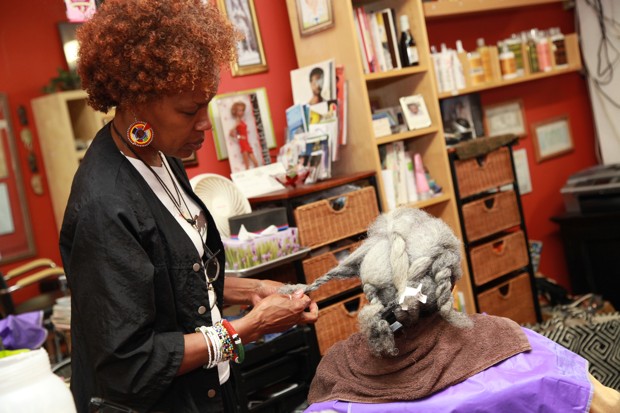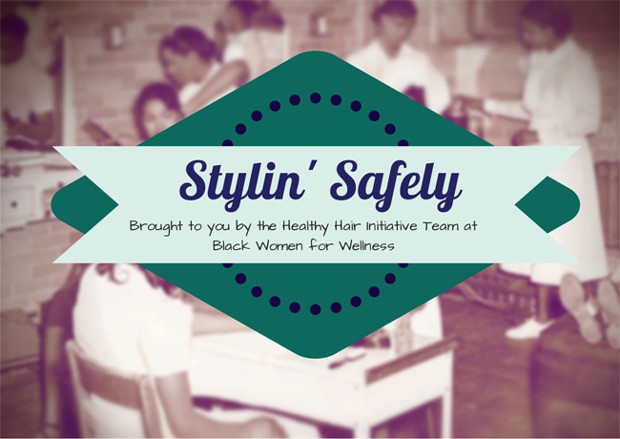The Fight to Rid Black Women's Hair Salons of Toxic Chemicals
From The Atlantic City Lab
November 6,2015
November 6,2015
Chemicals in hair relaxers
and other products can have dangerous side effects—especially for salon
workers. But a number of groups are trying to change that.
When Teni Adewumi surveyed
African-American salon workers in Inglewood, California, she kept seeing
the same health concerns over and over: Asthma. Dermatitis. Hair loss.
Uterine fibroids. Miscarriage. Veteran stylists told her they
experienced symptoms when they applied relaxers and other chemical hair
straighteners, and they now preferred working with natural styles. But
many didn’t know that the products they used could be making them sick.
Adewumi, a graduate student at the UCLA Fielding School of Public Health, works to close that knowledge gap as the environmental justice program coordinator at the California nonprofit Black Women for Wellness.
In salons across Inglewood and South Los Angeles, she helps train
stylists in safe products and practices, from ventilation and personal
protective equipment to ergonomics and label comprehension. But her work
is also part of a nationwide effort to make beauty salons safer for the
people—mostly women—who work in them.
That starts with research. Epidemiological
studies dating back to the 1980s have found that hair stylists are at
risk for a range of chronic occupational health conditions, including skin and respiratory diseases and adverse reproductive outcomes. Certain toxic chemicals found in hair glues and straighteners, such as formaldehyde, styrene, and trichloroethylene, have been linked to cancer, liver damage, and dermatitis.
“When we held focus groups with salon workers,
we found these stories of lack of education on chemical exposures and
chemical-related health problems,” Adewumi says. “Even though they had
all gone to beauty school, there was just really no training around what
these products could do to your body and to your reproductive system.”
That’s
partly because there’s precious little research on the long-term health
effects of salon products. Alexandra Scranton, director of science and
research at the environmental organization Women's Voices for the Earth,
explains: “The weakness in the data is being able to connect [health
impacts] to specific chemicals, because those connections are almost
never studied.” And so far, research has failed to account for the
combination of toxic chemicals found in hair salons. “They’ll look at a
chemical at a time, but of course a salon worker is never exposed to
just one chemical at a time,” Scranton says.
In the absence of comprehensive longitudinal
data, assessing the health risks of specific products is “an art as much
as a science,” Scranton says. Her organization singles out chemicals of
concern by drawing on watch lists created by governmental authorities—California and Washington state have them, along with the European Union—and recommends safer alternatives where available.
Regulatory gaps
The case of Brazilian Blowout offers a window
into federal regulation of the beauty industry. This professional
hair-smoothing product contains formaldehyde, a known carcinogen, which
is released into the air when hair treated with the solution is heated
with a blow dryer and flat iron.
In 2011, OSHA issued a hazard alert about formaldehyde exposure from Brazilian Blowout, and the FDA issued a warning letter
to the company, citing the product’s health risks and misleading
“Formaldehyde Free” label. But the agency had no power to recall the
product, even though it had been linked to “adverse events” including
eye, respiratory, and nervous system disorders. It was only after the
state of California sued the makers of Brazilian Blowout that they modified its formula, reducing
but not eliminating the formaldehyde content. Without mandatory recall
authority, the federal government could do little more than send
strongly worded letters.
The FDA regulates cosmetics in the U.S., but it
doesn’t approve products before they hit the shelves. It also doesn’t
require manufacturers to list the ingredients of professional salon
products. That means that, on the label, the word “fragrance” may stand
in for hundreds of unreported chemicals. “The burden is on us as
consumers or us as researchers to test these products,” Adewumi says.
That’s the reverse of the regulatory protocol in Europe, where cosmetic
products must undergo scientific safety assessment
before they can be sold. In the U.S., companies can ask for forgiveness
rather than permission, letting potentially hazardous products slip
through the cracks.
The risks are particularly severe for salon
workers, who have more exposure to these chemicals than consumers do.
These women are “a tough lot,” says Scranton. “They really love their
jobs, they really want to continue to work their jobs, so they tend not
to complain as much, even though their health is definitely suffering.”
And even when salon workers do report their health problems, public
health agencies are often unwilling or unable to help. They rely on
federal “permissible exposure limits” to determine whether a workplace
is hazardous. But those limits are mostly based on studies of healthy
adult men working in heavy industry—and even OSHA admits that they’re “outdated and inadequate for ensuring protection of worker health.”

These regulatory gaps are inseparable from historic gender and racial inequities
in clinical research. Before the 1990s, women and minorities were
consistently underrepresented in clinical studies, due in part to the
assumption that research on male subjects could be extrapolated to these
groups. Scranton says that the disparity is especially stark when it
comes to women of color: “I could find almost no studies on salon
workers who either are women of color or work with women of color, and
work with the different products that are marketed to women of color—the
hair relaxers, certain kinds of dyes, the hair glues for extensions,”
she says. “These are some of the products that seem to contain the most
toxic chemicals, and no one has studied them.”
Brazilian Blowout is one such “ethnic” beauty product, marketed to women seeking super-straight hair that conforms to European beauty standards. The natural hair movement is making a dent in demand for chemical straighteners; sales of hair relaxers fell 26 percent between 2008 and 2013. Still, according to a 2013 Nielsen report, African-American
women spend nine times more on “ethnic hair and beauty aids” than any
other group—and we don’t really know what’s in those products.
Salon workers have the most to lose from the
dearth of information. “There's a great need for better training and
warnings, and less [saying] ‘This is just the cost of the job,’” says
Scranton. “It shouldn't be the cost of the job. They shouldn't be paying
with their health.”
Recent progress
To protect salon workers across the board, federal cosmetic
regulations will need to change. Scranton and Adewumi want to see
legislation that requires manufacturers to list ingredients on all
beauty product labels; bans ingredients linked to cancer, birth defects,
and developmental harm; empowers the FDA to recall unsafe products; and
enforces stricter salon safety standards. With the powerful chemical lobby standing in the way, advocates have their work cut out for them.
But while they grind away at national policy, environmental
and women’s health organizations are making significant progress at the
state and local level—though mostly, so far, with nail salons, logical
partners in the reform effort. California, Boston, and King County, Washington, have certification programs for safe and healthy salons. New York state, in the wake of a widely-shared Times expose,
enacted emergency regulations to improve workplace conditions for nail
salon employees. Adewumi is currently working with the city of Inglewood
to create a pilot healthy hair salon recognition program.
And she’s still in salons, talking to workers about their
health. On the whole, she says, stylists have been receptive and eager
to learn more about greener products and practices. “We’re definitely
very aware about economics,” she says. “This is what they do for a
living, they are pillars in the black community, they are really strong
women in terms of starting their own businesses. We come in with this
open approach. We just want to talk to them, to know how they're doing …
addressing [health] issues in a holistic sense, and then bringing up
the conversation around product use.”

It’s a conversation Scranton encourages women to have with their own stylists. Women’s Voices for the Earth offers a number of informational materials about toxic salon exposures and products to avoid, which can kickstart the discussion about your stylist’s safety. “We
often encourage people to take those with them when they go to the
salon, and to have that conversation from the point of view of ‘I'm
concerned about your health,’ and not, ‘You work a toxic job,’” Scranton
says. “Com[e] from that standpoint of ‘I want to make sure that you’re
healthy because I appreciate the service that you're doing.’”
No comments:
Post a Comment